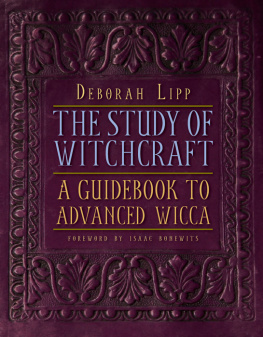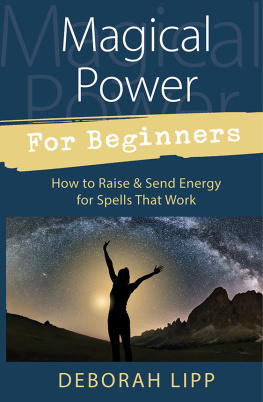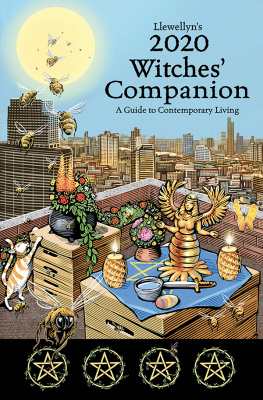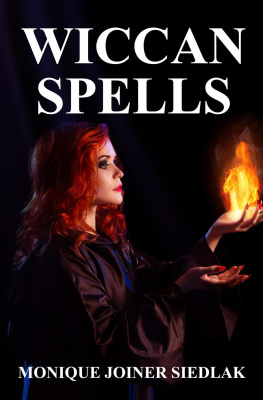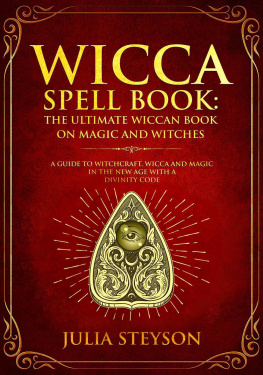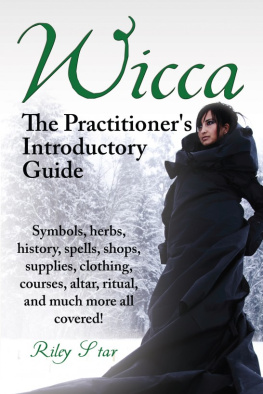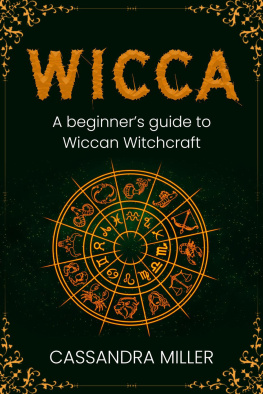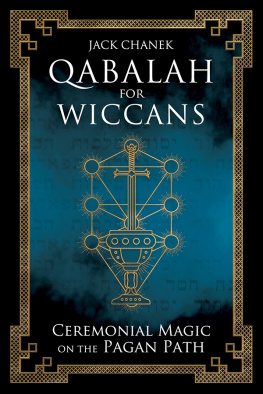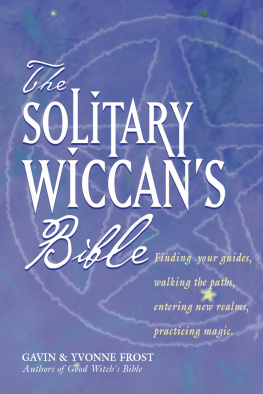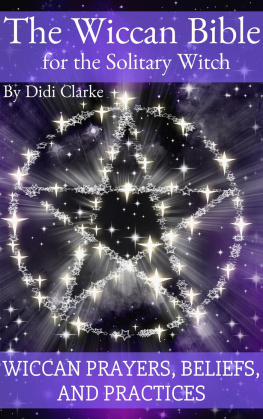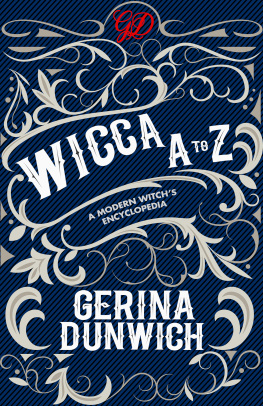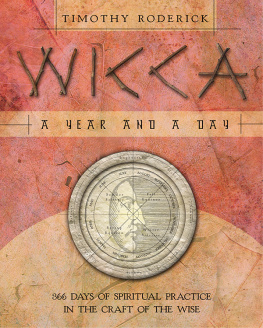
TO THE CLAN
First published in 2007 by
Red Wheel/Weiser, LLC
With offices at:
500 Third Street, Suite 230
San Francisco, CA 94107
www.redwheelweiser.com
Copyright 2007 by Deborah Lipp
Foreword 2007 by Isaac Bonewits
All rights reserved. No part of this publication may be reproduced or transmitted in any form or by any means, electronic or mechanical, including photocopying, recording, or by any information storage and retrieval system, without permission in writing from Red Wheel/Weiser, LLC. Reviewers may quote brief passages.
ISBN-10: 1-57863-409-1
ISBN-13: 978-1-57863-409-5
Library of Congress Cataloging-in-Publication Data available upon request
Cover and text design by Dutton & Sherman
Typeset in Adobe Garamond, PrioriSer, and HFLibris
Cover photograph Mateusz Drozd
Printed in Canada
TCP
10 9 8 7 6 5 4 3 2 1
CONTENTS
ACKNOWLEDGMENTS
It would be impossible to accurately cite all the influences and contributions to this book. My own study of witchcraft has been going on for over twenty-five years and there have been many, many teachers, friends, and helpful acquaintances along the way. I hope that, if I fail to mention you, you will somehow feel acknowledged anyway.
First of all, this book germinated as a post on the Mystic Wicks message board, and so I must acknowledge that board and its owners, as well as the many people who have interacted with me there, asking me questions, making contributions, challenging me, and asking for more. The people who simply wanted recommendations, and more to study, contributed as much or more than the well-educated people who offered resources and ideas. So I thank you all.
Susan Carberry, my first teacher in the Craft, is the real source of this book, because the idea of studying everything and reading voraciously as part and parcel of witchcraft came from her, and her reading list was glorious. Contributions to specific sections were gratefully accepted from Isaac Bonewits, Donald Michael Kraig, Judy Harrow, my mother Paula Gellis, Michelle Hull, and the Canadian Gardnerian and Alexandrian discussion board.
During the course of writing this book, I had a computer meltdown and a hard drive crash and a fatal error in my backup drive, and so I may have omitted a thank you, since I lost some of the notes I was keeping about what contributions came from whom. Nonetheless, thanks.
And thanks to Gary Harper and Hermes who helped restore my computer to life. Where would I be without it (and without them)?
A big thank you to Brenda Knight for believing in this book and to Isaac Bonewits for showing it to her.
Finally, thanks to my son, Arthur Lipp-Bonewits, for occasionally getting off Facebook long enough to let me write, and managing to grow up so very, very well despite the fact that I'm always writing instead of doing more traditional maternal things.
FOREWORD
Learning witchcraft? Well, it's kind of like cooking. Let me explain:
Come right into my kitchen and I'll teach you to cook. This thing over here, it's called a stove. You'll need to learn how to use it. And how to clean it. You may even be interested in maintenance. But enough about the stove, I'm not here to teach you that.
This is a spice rack. You might want to know what the spices are. Or maybe not, I don't know. I use them all the time when cooking. But let's move on. This is a souffl pan, this is a measuring cup, these are cookie cutters; they all work about the same.
Now you're ready to make a simple three-course dinner.
What's that, you say? You don't have the information you need? You don't know which ingredients to use or why? Sorry, I can't help you.
Learning witchcraft, like learning to cook, can be confusing. And both can depend pretty heavily on the quality of the teacher.
To those of us who learned our witchcraft (or Wiccathey're not quite the same thing, as author Deborah Lipp makes clear in the present volume) and Paganism back in the Dark Agesthe 1960s and 70ssuch disorganized, undirected, anarchic, and free approaches to teaching bring back memories of our worst (would-be) teachers, not our best. Yet this is exactly what modern students trying to stay afloat in the flood of good, bad, weird, and just plain silly books about the Craft find themselves experiencing. There's more information today than there was back then, but in a way it's even more confusing.
Fortunately, Deborah Lipp has a life preserver for you. In The Study of Witchcraft, this experienced Wiccan high priestess tells you what you might need to know, and even better, how to learn what you might need to know. Whether you are an experienced Wiccan priest or priestess, a member of a study group, a solitary-by-choice student, or a brand new baby Pagan, Deborah gives you a flexible, organic study guide that will meet the particular needs of your kind of witchcraft.
In fact, experienced Wiccans may get the most out of this book, since it skips most of the Wicca 101 stuff that seems to be in every book on every shelf, and gets into areas most authors never touch. Oh, sure, it's easy to find out about the eight holidays, about the Wiccan Rede, about any of the half-dozen basics, but don't you want more? Don't you want to take apart your stove? Grow your own herbs for your spice rack? Invent your own souffls? Deborah's book is here to help you become a Wiccan master chef.
She understands that there are several different approaches to the study and practice of the Craftshe calls them Traditional, Eclectic, and Radicaland that different students are interested in different topics
Through The Study of Witchcraft and its directed reading and practice tips, you will learn about far more than any other book on Wicca offers. You'll study our real history, learn about the evolution of Wicca in the 1980s, 90s, and oh-ohs, and dig into the many topics that every Wiccan should know, such as psychology, Western occultism, myth and folklore, meditation, psychic self-defense, astrology, healing, and herbalism. What's more, by the time you're done, the connections will seem clear and obvious to you!
Consider this book the Wiccan equivalent to an instruction guide for a tailor-your-own-degree program at a liberal college. Don't just read through the chapters; read the recommended books as well (while avoiding the bad or silly bits in themDeborah helpfully points out many of those), and do the exercises and homework assignments that match your needs and interests. Yes, this means work. Fortunately, you'll be having so much fun doing it, you won't mind!
I can't say whether it's because or despite the fact that she's my ex-wife, but Deborah Lipp is an excellent Wiccan teacher, a fine writer, and someone who has thought long and hard for many years about how to guide students without stifling them. If you are looking for a way to make sense of the chaos of modern Wiccan books, I can think of no better text to recommend than this, The Study of Witchcraft.
Isaac Bonewits, March 2007
PREFACE
When I was a girl, I had to walk two miles to school every day, and it was uphill both ways. Okay, that's not quite true. Actually, only the both ways part isn't true. And the girl part may be suspect. The two-mile walk, in a town called Mountain Lakes, New Jersey, was indeed up a very steep hill (one way), but I only lived there for my last two and a half years of high school, so to refer to myself as a girl may not be accurate.
But I digress.
When I began to study Wicca, back in the Dark Ages of 1981 when the Internet did not yet exist and dinosaurs roamed the Earth, it was much more difficult than it is for novices today. Wicca (a word we used interchangeably with witchcraft at the time) was very much in the closet, and did not enjoy the wider acceptance it does today. There were only a handful of books on the subject, some of which were quite bad. Active groups were few and far between, and finding them was a challenge. When you did find a group, you studied hard and threw yourself into the process.
Next page
